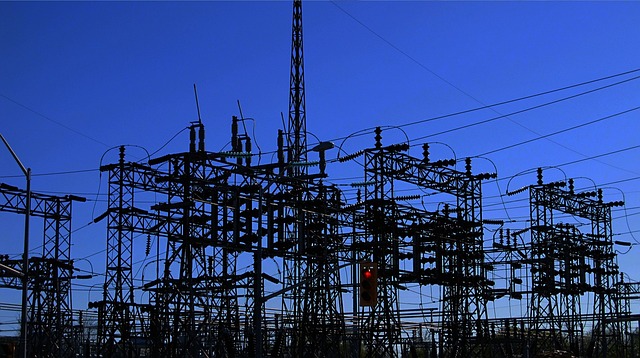In case of emergencies like power outages or electrical fires, skilled electricians play a critical role in promptly diagnosing and repairing electrical issues, ensuring public safety and minimizing risk. Upon arrival at an emergency, electricians conduct thorough inspections to locate and assess the extent of electrical problems. They work under pressure, strictly adhering to safety protocols while managing complex tasks. Their coordination with utility companies and emergency services is key to swift service restoration. Beyond immediate repairs, electricians provide valuable insights for long-term preventative measures to reduce future emergencies. Homeowners should have a reliable electrician on hand for urgent repairs or post-outage assessments, and maintain safety by using surge protectors and UPS devices. An emergency kit with essentials like flashlights and battery-powered devices is recommended. Regular checks on backup generators or alternative power sources are essential to ensure they function during needed. It's important to understand the causes of outages, whether due to severe weather, equipment failure, or maintenance, to effectively respond and plan accordingly. Safety is paramount; only qualified electricians should handle repairs or inspections. Being proactive and well-informed enables homeowners to navigate power outages with confidence and the necessary precautions in place. Keywords: Electrician services for emergencies, power outage preparation, safety during electrical issues, long-term preventative measures, surge protectors, UPS devices, emergency preparedness.
When the lights flicker and plunge your world into darkness, or an electrical fire ignites, the role of an electrician transcends routine repairs. This article delves into the critical actions these professionals take in responding to emergencies such as outages and fires, ensuring community safety and power restoration. We’ll explore essential steps for homeowners to prepare for power outages, the importance of regular electrical inspections, and the specific equipment electricians carry to tackle these crises effectively. Through case studies and expert insights, we will uncover the intricacies of emergency response protocols, training, and legal considerations governing emergency electrical services. Join us as we shed light on the multifaceted role of electricians in safeguarding our homes and communities during these unexpected events.
- Understanding the Role of an Electrician in Emergency Situations
- Preparing for Power Outages: Steps Every Homeowner Should Know
Understanding the Role of an Electrician in Emergency Situations

When emergencies, such as power outages or electrical fires, strike, the immediate response often involves safety measures and emergency services to manage the situation and ensure public safety. Within this critical context, electricians play a pivotal role. They are trained professionals skilled in diagnosing and resolving electrical issues promptly and effectively. Their expertise is crucial in assessing the extent of damage, identifying potential hazards, and implementing corrective measures to restore power or prevent further incidents.
Upon arrival at an emergency site, an electrician conducts a thorough inspection to determine the source and scope of the problem. They are equipped with specialized tools and knowledge necessary to work under pressure, adhering to safety protocols while performing complex tasks. Their swift actions can mitigate risks and prevent catastrophic failures that could escalate the emergency. Electricians coordinate with utility companies and emergency personnel to ensure a collaborative approach to restoring service and safeguarding the community’s well-being. Their role in emergency situations is not only to rectify immediate issues but also to provide insights for long-term solutions, thereby minimizing the likelihood of future occurrences.
Preparing for Power Outages: Steps Every Homeowner Should Know

In the event of power outages, homeowners must be prepared to handle the situation effectively and safely. One of the first steps is to have a reliable electrician on call for any urgent repairs or assessments post-outage. This professional can not only restore power but also inspect your electrical system for potential damage caused by the interruption. It’s crucial to keep the contact information of a trusted electrician readily available, as timely response can prevent further complications such as appliance malfunctions or fire hazards. Additionally, homeowners should invest in surge protectors and uninterruptible power supplies (UPS) to safeguard sensitive electronic equipment from voltage spikes when power is restored. Preparing an emergency kit with flashlights, battery-operated devices, and essential supplies like medication and bottled water is also a prudent measure. Regularly testing your home’s backup generators or power sources ensures they are functioning correctly during an outage. Understanding the different types of outages, whether due to severe weather, equipment failure, or maintenance work, can help you plan accordingly. Above all, safety should be the priority; never attempt to inspect or repair electrical issues yourself unless you are a qualified electrician, as this can pose serious risks. Being proactive and well-informed about power outages empowers homeowners to manage these situations with confidence and care.
When the lights flicker and the power goes out, the critical role of an electrician becomes evident. Their expertise in responding to emergencies, such as outages or electrical fires, ensures public safety and system integrity. Homeowners can prepare for these events by following specific steps to mitigate disruptions. In summary, the collaboration between skilled electricians and proactive homeowners is key to maintaining a reliable power supply and safeguarding against unexpected emergencies. For comprehensive guidance on emergency preparedness related to electricity, consulting a professional electrician is always advisable.
